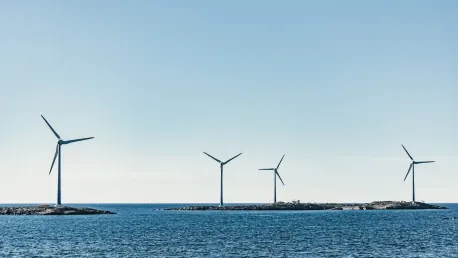The sudden withdrawal of Shell from the Atlantic Shores Offshore Wind project has raised substantial questions regarding the future viability and progression of this ambitious initiative. Initially a promising collaboration between Shell and EDF Renewables, the project aimed to leverage a substantial 2.8 gigawatts (GW) capacity off the coast of New Jersey. However, the recent developments, including significant financial impairments, cast a shadow of uncertainty over the project’s future. This article delves into the ramifications of Shell’s exit and explores whether Atlantic Shores stands a chance of thriving amid these challenges.
Understanding the Setbacks
The Impacts of Shell’s Withdrawal
The abrupt exit of Shell from the Atlantic Shores project in early January resulted in a staggering $1 billion impairment on its investment. This departure catalyzed a chain reaction, with EDF Renewables also booking a nearly equivalent impairment of $980 million. Both financial adjustments underline the profound impact and deep uncertainties now enveloping the project. Shell’s withdrawal was not merely a financial adjustment but a significant blow to the project’s workforce, planning, and stakeholder confidence. It is a testament to the volatile nature of investments in renewable energy, especially when such investments are exacerbated by political and regulatory fluctuations.
The Atlantic Shores Offshore Wind project was pivotal, positioning New Jersey as a leader in offshore wind energy. Initially, the received approval from the Bureau of Ocean Energy Management in October indicated a firm path forward. However, Shell’s retreat not only destabilized the financial structure but brought into question many logistical and operational aspects. The envisioned completion date of 2028 now seems increasingly uncertain, leaving EDF with the challenge of sustaining the project’s momentum amid these complications. The significant impairments reflect the immediate financial repercussions and symbolize the broader challenges within the renewable energy sector.
Compliance Amidst Uncertainty
Following Shell’s departure, Atlantic Shores assured its commitment to continuing the development phase in New Jersey. Despite the turbulence, the project communicated its intent to adhere to local, state, and federal obligations. This commitment underscores the project’s determination to meet existing lease and permit requirements, demonstrating resilience even amidst uncertainty. However, this steadfast dedication is tested by more than just the financial adjustments. The New Jersey Board of Public Utilities (NJBPU) canceled the state’s fourth offshore wind solicitation, attributing the decision to a combination of factors, including Shell’s abrupt exit and the unpredictability of federal permitting procedures.
The stance taken by NJBPU President Christine Guhl-Sadovy further highlights the multifaceted challenges the project faces. While acknowledging the myriad benefits offshore wind brings to the state, she emphasized that advancing with the fourth solicitation under current conditions would be impractical. Such decisions illustrate the broader tension within the U.S. offshore wind sector, where political and business climate fluctuations seriously affect project feasibility and progression. The ripple effects of these regulatory decisions are profound, impacting stakeholders’ confidence and the overall viability of renewable energy initiatives in the region.
Navigating the Political and Business Landscape
The Complexity of EDF’s Position
EDF Renewables’ decision to reassess and book nearly a billion dollars in impairments reflects the precarious position of offshore wind projects in the current American political landscape. Shell’s unexpected exit served as a glaring reminder of the liquidity and instability inherent to such large-scale endeavors. The impairments are not just a financial reality check but also signify the heightened level of caution required as projects navigate through layers of political and bureaucratic uncertainties. These developments emphasize the need for strategic resilience and robust financial planning in the face of unforeseen disruptions.
The New Jersey Board of Public Utilities’ (NJBPU) move to cancel the fourth offshore wind solicitation due to these uncertainties further adds to the complexity. The decision, driven by cautious pragmatism, is also a recognition of the broader market dynamics and the short-term impracticality of sustaining new initiatives under current conditions. EDF Renewables faces the delicate task of balancing immediate setbacks with long-term aspirations, recalibrating strategic approaches while maintaining stakeholder confidence. The company’s ability to adapt and respond to these dynamic challenges will significantly shape the project’s trajectory moving forward.
Strategic Insights and Future Considerations
The broader situation underscores the critical interplay between political climates and renewable energy investments. The persistent volatility within the U.S. offshore wind sector exemplifies how deeply interconnected these projects are with regulatory stability and political consistency. Stakeholders are acutely aware that even well-laid plans can face sudden derailments due to shifts in political landscapes or policy decisions. For Atlantic Shores, navigating through these unpredictable waters demands meticulous strategic foresight and an adaptable approach to stakeholder engagement and project management.
As Atlantic Shores endeavors to regain stability and momentum, several critical strategies are essential. Prioritizing transparent and continuous communication with stakeholders, refining risk management frameworks, and leveraging technological advancements for operational efficiencies are vital steps forward. Despite the setbacks, the project’s inherent potential remains substantial. The renewable energy sector, rife with challenges, also offers significant opportunities for growth and innovation. By harnessing strategic resilience and adaptive planning, Atlantic Shores can still articulate a path toward a viable and impactful future in offshore wind energy.
Future Outlook for Atlantic Shores
Reassessing Partnerships and Vision
The Atlantic Shores project’s future now hinges on reassessing partnerships and reinforcing its founding vision. The initial collaboration between Shell and EDF anticipated a synergistic approach to exploit the vast potential of New Jersey’s offshore wind capacities. Shell’s exit disrupts this balance, pushing EDF to restructure and strategize anew. Evaluating potential new partnerships or even state and federal assistance could serve as a pivotal turning point. It reflects a necessary recalibration to align expectations with on-ground realities, ensuring that the project’s trajectory remains aligned with its sustainability goals.
Moreover, re-engaging with federal and state authorities to navigate permitting uncertainties and leveraging public support will be crucial. The ongoing dialogue between project stakeholders and regulatory entities must be reinvigorated. These interactions pave the way for enhanced coherence in regulatory expectations and project deliverables, fostering a collaborative approach to overcoming present obstacles. Reinforcing a shared vision of renewable energy progress in New Jersey will require concerted efforts across multiple fronts, underscoring the complexity yet the promise embedded within the Atlantic Shores venture.
Conclusion: A Way Forward
Shell’s sudden pullout from the Atlantic Shores Offshore Wind project has stirred significant questions regarding the project’s future prospects and overall feasibility. The initiative was initially a hopeful partnership between Shell and EDF Renewables, aiming to utilize a 2.8 gigawatts (GW) capacity situated off New Jersey’s coast. Recent developments, however, have cast a shadow of doubt over this venture’s continuity. Financial setbacks have notably contributed to this uncertainty. This article explores the broader implications of Shell’s withdrawal and questions whether the Atlantic Shores project can overcome these mounting challenges and remain viable. EDF Renewables now faces the task of re-evaluating the project’s structure, possible financing alternatives, and perhaps seeking new partnerships to keep the plan on track. As the wind energy sector expands, the outcomes of situations like this offer instructive lessons for future ventures, emphasizing the importance of adaptable strategies and robust financial planning.









